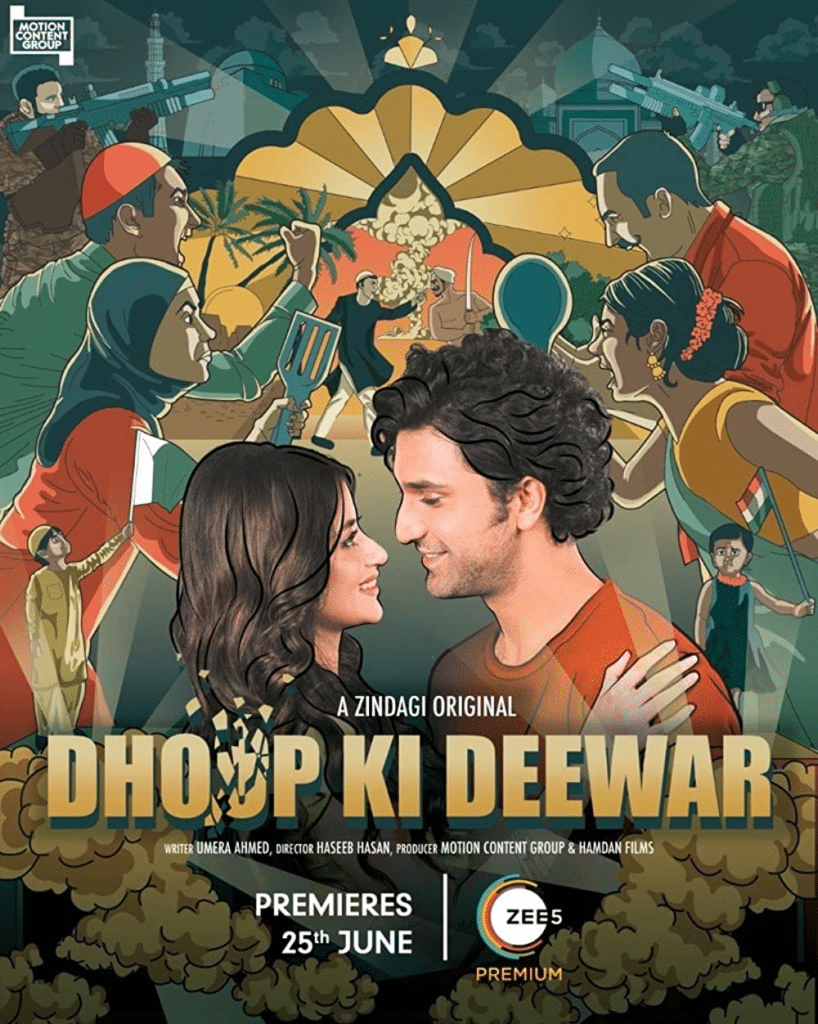
Zee5 Zindagi’s Dhoop ki Deewar has a relatable charm to it which reminds you so much of the old world of simple storytelling that somehow, we have left so far behind that it almost smells like a while ago.
Directed by Haseeb Hasan, written by Umera Ahmed could be a story of you and me because the hard reality for a lot of people living in the sub-continent is to live with the manufactured hatred against each other, sown so deep and so divisive that it may be difficult to separate fact from fiction.
It is only once that you step away from the country of origin angle you see stories of pain, suffering, and just plain and simple humanity of a sub-continent divided yet one.
The story is simple, and the human angles are very well portrayed. We are reminded of the uncomplicated lives of people for whom the banter of India versus Pakistan cricket matches enlivens the living room evenings, and the excitement of that possible win still makes their eyes twinkle with genuine pride and joy.
A cross-border firing has concluded in the death of the fathers of both Vishal and Sara. Both were colonels in the Indian and the Pakistani Army respectively and much loved and admired by their families.
Engulfed by the media and friends, as also their own family turned opportunists when given the chance, Vishal and Sarah struggle with coping same emotions. The mothers maintain a calm facade for the sake of their family, even as they are unable to sleep. All of the characters on both sides of the border have their own story of trauma.
Ahad Raza Mir is an artist who puts his soul into his character. You can really see the hard work that has gone into him living as Vishal; the Atif Aslam fan, like many other Indians and Sara, where Sajal Aly epitomizes so many Pakistani teenagers who aspire to dance or dress like Bollywood stars.
If you like in the United States like us or anywhere but the sub-continent, your best friends may be Pakistanis and you quickly forget to differentiate because you have more in common to celebrate than to berate.
You will watch this series with them and discuss the whole ridiculousness of this unfounded animosity. You will unabashedly proclaim your love for Fawad and undying stanning towards Mawrah.
And they in turn will love your Bollywood in the same way as they will appreciate everything else of common heritage.
There will not be a feeling of yours and ours left soon.
Then you watch how Sara and Vishal traverse their relationship across the acrimonious border. You will see how it is more than just the division of land.It is the creation of the mind of people whose interest it serves to keep it so divided and wonder if it’s so worth it for them to keep so much hatred at the front and center of their lives.
But then we all know that the politics of fear and anger has always trumped that of love and peace.
Dhoop ki Deewar shows you the other side of the coin should you want to add that to your perspective.
This review is based on watching 10 out of the 18 episodes that we were asked to preview. The lovely writing and ideology are well crafted on canvas. What we found missing was perhaps a more authentic Delhi touch. Though a lot of language sanitization had occurred in the accents, however script and inflection of the tone was of the Urdu not spoken in New Delhi, nor was it of the drawl.
Sajal shines in her portrayal of Sara through her trauma and realization of the same pain in Vishal.
Torn by tragedy but healed by pain, the conversations between the two are well initiated, and sometimes you would want to re-run them just to understand how sometimes crucial conversations must be just very simply crafted for the bigger issues to resolve themselves.
Whether the story fits into your sensibilities or not, peace should.
We recommend that you watch this drama.
REVIEW OF EPISODES 11-18
Dhoop Ki Deewar is an extremely compelling watch especially if you or your family have been the victims of the partition or the outcome of the animosity between India and Pakistan over the last 75 years.
The writing, dialogues, and storytelling as well as the sequences in the penultimate or the last episode compel the audience to not only think about the wars we have fought endlessly but also the human side of the equation that often gets shadowed by the patriotic fervor.
The similarities between the two countries and their people seeped deep in their poverty of thoughts and actions, its deep-rooted patriarchy, greedy relatives, choices are almost blind to the pain and sacrifice of the two families who have lost their sons in a war that was never required to be fought. One thing that the story drives home effectively is that the people on either side of that border are more similar to each other than they would like to believe. The two families in grieving find more in common with each other in their pain than they do with their own countrymen. the relationship of empathy, pain, and love transcends hatred and suspicion.
Even when the accent, the little deets of the Indian side leave much to be desired, this is still a story that needed to be told a long long time ago. And we are glad it is now told. We highly recommend it.




